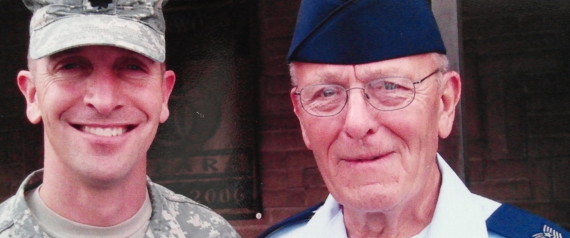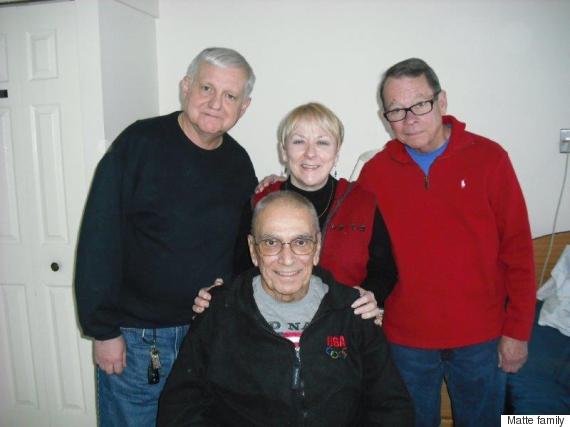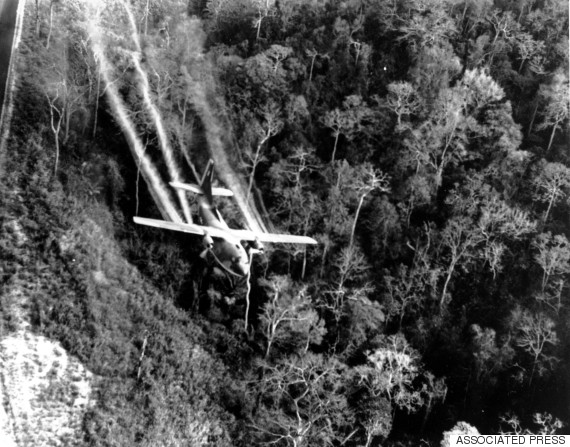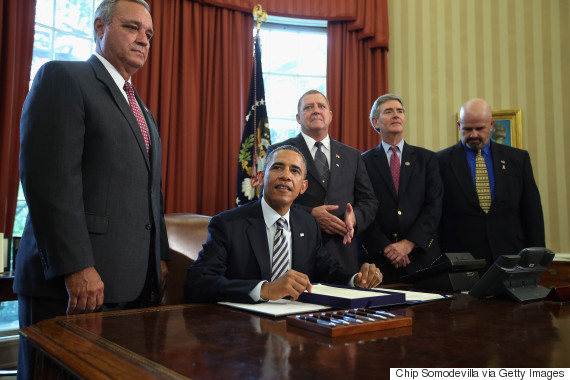Retired Senior Master Sgt. Leslie Howe has battled two cancers -- non-Hodgkin lymphoma and prostate cancer, both of which have been
linked with exposure to Agent Orange, the herbicide used by the U.S. military to destroy enemy cover and crops during the Vietnam War. Howe, 71, was never actually in Vietnam during the conflict, but in the 1980s he served aboard Air Force planes that
contained trace amounts of the defoliant. Still, the U.S. Department of Veterans Affairs twice denied Howe's benefits claim, telling him in a letter that it "could not find a link" between his medical conditions and his military service.
"I flew in good conscience on that aircraft, not knowing the danger," said Howe, who recalled a distinct "aroma" at times while he worked in the aircraft as an air medical evacuation technician. "I did it because I wanted to serve my country."
C-123 veterans reunited in early 2014: Master Sgt. Les Howe (back left), Master Sgt. Richard Matte (front center), Lt. Col. Mary Griffin-Bales (back center) and Senior Master Sgt. Steve Caraker (back right). (Matte family)
Similarly, retired Master Sgt. Casimir Cerniauskas, a World War II refugee from Lithuania, never hesitated in his decision to serve his adoptive country. He spent 37 years in the U.S. Air Force, including years loading and unloading cargo from contaminated C-123 airplanes -- the craft
used to
deploy Agent Orange in Vietnam -- in the U.S. after the Vietnam War had ended. Today, he's undergoing chemotherapy for myelodysplasia, a type of blood cancer, after already fighting non-Hodgkin lymphoma and being told that he couldn't qualify for the same Agent Orange-related benefits granted to veterans who served in Vietnam, where they were assumed to have encountered the herbicide.
"I don't regret serving," said Cerniauskas, whose three sons have all graduated from West Point and been deployed in Iraq and Afghanistan. "But how they make veterans wait, it makes me sick. They are dying. It's not right."
Howe and Cerniauskas both said they will be refiling their claims, now with renewed hope after what they say was a long-overdue policy change announced by the VA in June.
The limits and lags in medical care and disability benefits for veterans are well established. Look no further than a
federal lawsuit filed in April by combat-injured veterans forced to wait up to two years or more for required records from the VA before they could apply for benefits. Jon Stewart, host of Comedy Central's "The Daily Show," has
repeatedly called out the agency for its red tape and backlogs of claims. As The Huffington Post
recently reported, nearly one-third of the 847,000 veterans with pending applications for health care through the VA have already died.
But perhaps no population of veterans are more frustrated by VA denials and delays than those who believe they were sickened by environmental exposures during their service. Many of those vets have stories and complaints similar to Cerniauskas and Howe's.
"The way the VA is doing things, and has been for quite a while, is just unfair," said Rod Longino, who served on an aircraft carrier during the Vietnam War and recalled "constant contact" with planes that had been through areas of "active defoliation" in Vietnam. Longino never entered the country himself during the conflict, but he has since been diagnosed with prostate cancer, respiratory disease and Type 2 diabetes, all conditions that have been linked with Agent Orange.
"I'm a poster child for Agent Orange," he said. The VA denied him benefits for the same reason they had the C-123 veterans: He hadn't been in the right place at the right time.
Agent Orange isn't the only concern. Thousands of former and current military personnel have encountered a number of other toxicants, from
contaminated drinking water at North Carolina's Camp Lejeune to
burn-pit smoke in the Middle East to
plumes of radiation off the coast of Fukushima. More than 130
contaminated military sites are included on the U.S. Environmental Protection Agency's National Priorities List. Exactly how many veterans have developed exposure-related illnesses remains unclear, in part because it can take years, or even decades, for an exposure to manifest as a health problem like cancer or respiratory disease.
While the VA maintains that it does its best to be fast and fair, some advocates suggest that the roadblocks to care and compensation for those sickened by environmental toxicants go beyond simple bureaucratic inefficiency.
"The VA is following a careful script with exposures," said an aide for Sen. Richard Burr (R-N.C.), who has been an active advocate for veterans exposed to toxicants. "They are trying to hold off as much of the science as long as they can, concerned about the ramifications for their enterprise."
Chris Portier, former director of the Agency for Toxic Substances and Disease Registry at the U.S. Centers for Disease Control and Prevention, said his team determined a few years ago that the C-123 veterans could have breathed, absorbed and consumed enough residual dioxin, a component of Agent Orange, to have gotten sick. Dioxin is a known carcinogen and can disrupt the normal functioning of hormones, as well as immune, nerve and reproductive cells.
"We wrote the VA a pretty straightforward letter in 2012," said Portier. "But the VA didn't want to believe it when we said [the C-123 veterans] got these exposures." It took "congressional intervention" regarding the C-123 planes, he said, before the VA "had nowhere to go but to deal with the issue."
Bart Stichman, an attorney and joint executive director of the National Veterans Legal Services Program, told HuffPost that the delays follow a pattern at the VA, as illustrated by its actions and inactions concerning Agent Orange. Stichman's legal group represents C-123 veterans as well as so-called Blue Water Navy veterans, like Longino, who believe they were exposed to Agent Orange while serving offshore of Vietnam during the war.
"They've dragged their feet on the issue for a very long time," said Stichman. "All the way back to the late 1970s, when the issue first surfaced about Agent Orange."
Poisoned planes
During the 1970s and '80s, Howe and Cerniauskas were among a couple thousand Air Force reservists who served aboard repurposed airplanes that retained small amounts of Agent Orange after the Vietnam defoliation missions. The herbicide was ultimately revealed to cause cancer, diabetes and neuropathy, among other conditions. In 1991, decades after the health risks had become known, Congress
ordered the VA to begin providing benefits to veterans who'd been exposed to the substance.
In May 1966, a U.S. Air Force C-123 flies low along a South Vietnamese highway spraying defoliants on dense jungle growth beside the road to eliminate ambush sites for the Viet Cong during the Vietnam War. (AP)
But initially, only veterans who served with "boots on the ground" during the war were eligible for those benefits -- which is why despite showing classic symptoms of Agent Orange exposure, C-123 and Blue Water veterans had generally been denied the same help.
Last month, the VA announced a new rule that at least heartened one of those groups. Cerniauskas, Howe and their fellow C-123 veterans are now eligible for the Agent Orange presumption. Fewer than 400 of them are expected to file claims, for a total VA expenditure that is estimated to eventually reach $47 million.
Still, despite this victory, many C-123 veterans remain frustrated. They lament how long it took the agency to make its determination, which came months after a January
federal report concluding that lingering amounts of the herbicide on the fleet of C-123s could indeed have
sickened the reservists.
"That report was based on science done years ago. There was no new research," said Retired Maj. Wes Carter, who served aboard C-123s after Vietnam. "The VA had confirmation of the exposure back in 2011. They sat on the evidence."
The VA's offering is also not quite complete, some veterans and advocates argue. The agency, mirroring some of its prior policies, decided not to provide the newly eligible vets with retroactive compensation through the new ruling, a move Carter called "arbitrary" and "unconstitutional."
Meagan Lutz, a spokeswoman with the VA, confirmed that the new help is only available beginning on June 19, when the rule was published, or from the subsequent filing date. Widows of C-123 veterans, she said, will not be eligible for the disability compensation.
Carter himself was denied Agent Orange-related benefits for his cancer, heart disease and other medical problems, but still receives full disability due to other injuries from his military service. Many of his sick comrades, however, have struggled financially, some even passing away, in the decades since their service.
Critics have accused the VA of taking much longer than needed on the C-123 eligibility extension, saying that because the agency took years to bring those veterans into its Agent Orange benefits structure -- and because it is not offering retroactive compensation -- it will end up paying out just a minimal sum, since so many eligible veterans have already died and the ones who are left are getting on in years.
"Most folks have watched a serious amount of money go out the window," said Carter, who has been
leading the effort on behalf of this community of veterans.
A representative for the VA did not immediately respond to a request for comment on the matter.
A history of frustration
Retired Master Sgt. Jerry Ensminger knows well the plight of the C-123 vets. In August 2012, after years of crusading for his comrades' cause, Ensminger stood alongside President Barack Obama as he signed legislation to provide medical care for Marines and their dependents who may have been affected by water contamination at North Carolina's Camp Lejeune Marine Corps Base between the late 1950s and the 1980s. The act was named after Ensminger's daughter, Janey, who was born on the base and died of a rare form of leukemia at age 9.
President Barack Obama signs the Janey Ensminger Act of 2012 as retired Master Sgt. Jerry Ensminger (third from left) looks on. (Chip Somodevilla/Getty Images)
In a recent interview with HuffPost, Ensminger mentioned what a long time it had taken to achieve that legislation, despite scientists linking chemicals in the camp's water, such as
trichloroethylene, with cancers and other health conditions now affecting his group of veterans. He also lamented the challenges that still face veterans seeking the government's help.
Just two years after the Janey Ensminger Act was signed, a seemingly unrelated Supreme Court case threatened to undo some of that progress by adding an additional barrier to Marines seeking compensation through lawsuits. The SCOTUS
ruling in favor of CTS Corp., whose former electronics plant had leached toxic chemicals into local well water in North Carolina, upheld a state statute that cuts off liability 10 years after the last contaminating act by a company -- or by the government.
In one of its amicus briefs, the Department of Justice openly stated that the CTS case had implications for "ongoing litigation against the United States" over "allegations of contaminated drinking water" at Camp Lejeune.
Some advocates argue that Obama's Camp Lejeune bill itself fell short by only providing medical care, and not compensation for injury or disability. Ensminger also pointed to what he suggests is another, more recent, VA strategy to avoid these latter payouts. The agency has lately begun consulting with a group of nearly two dozen health professionals who offer their opinions about whether a veteran should receive disability benefits. Since these professionals became part of the process, Ensminger said, the rate of claim approvals has plummeted.
"Every time Congress passes a new law that will create a whole new batch of consumers, so to speak, then the VA scurries around and creates all kinds of their own rules," said Ensminger. "They are terrified by these environmental exposures that keep popping up."
He referred to a Veterans Health Administration PowerPoint presentation that outlined the implementation of the 2012 Camp Lejeune legislation. Under the heading "Implications and Complications," a bullet read: "Does this set a precedent for other military camps, posts, & stations that are potentially contaminated?" Among the environmental issues listed was residual Agent Orange contamination at a test site in Gagetown, Canada, and on C-123 airplanes.
Dan Sullivan -- co-founder of the nonprofit Sergeant Sullivan Center, which aims to raise awareness of the struggles faced by sick soldiers returning from the Middle East -- also said he sees a general "resistance" on the VA's part to acknowledge that the conditions soldiers experience in the line of duty may be linked to the ailments they develop later. Sullivan's brother, Sgt. Thomas Sullivan, suffered from chronic widespread pain, swelling and severe inflammatory bowel issues after serving in Iraq. He succumbed to the mysterious suite of illnesses in February 2009.
Experts have begun to link some veterans' medical issues with chemicals found in the
plumes of smoke that rise from burn pits. The practice of burning feces, plastic bottles and other solid waste in open pits, often with jet fuel, was especially common in the early years of the U.S. military’s presence in Iraq and Afghanistan.
"It's still difficult to get a VA recognition of disability associated with burn pits," said Sullivan. Congress has directed the VA to establish a
burn pit registry to aid in identifying potential long-term health effects.
Dr. Gerald Cross, chief officer for the VA's Office of Disability and Medical Assessment, acknowledged that "environmental issues will be very important in the future." He emphasized that his agency is trying to be "very sympathetic" of the veterans, and said the experts they've hired to review Camp Lejeune cases share the same commitment.
Linda Birnbaum, director of the National Institute of Environmental Health Sciences, said that she had spoken with the VA on "more than one occasion" to discuss the science around C-123 planes, Camp Lejeune and the persistent effects of certain chemicals.
"I did not understand how they could say there was no potential for exposure on the C-123s," said Birnbaum.
She added that she was similarly mystified there was any dispute about the water contamination at Camp Lejeune.
"When you look at the compounds present in that drinking water," she said, "where's the surprise that there would be potential for adverse health effects?"
But some longtime critics are beginning to voice cautious optimism about the VA's treatment of environmentally exposed veterans. Last Thursday, the VA awarded its first C-123 disability claim processed under the new Agent Orange rule to retired Lt. Col. Edward Kosakoski, who is currently in home hospice care with prostate cancer.
"Good job, VA," wrote Carter in an email announcing Kosakoski's news to other C-123 veterans. "Keep it up!"











